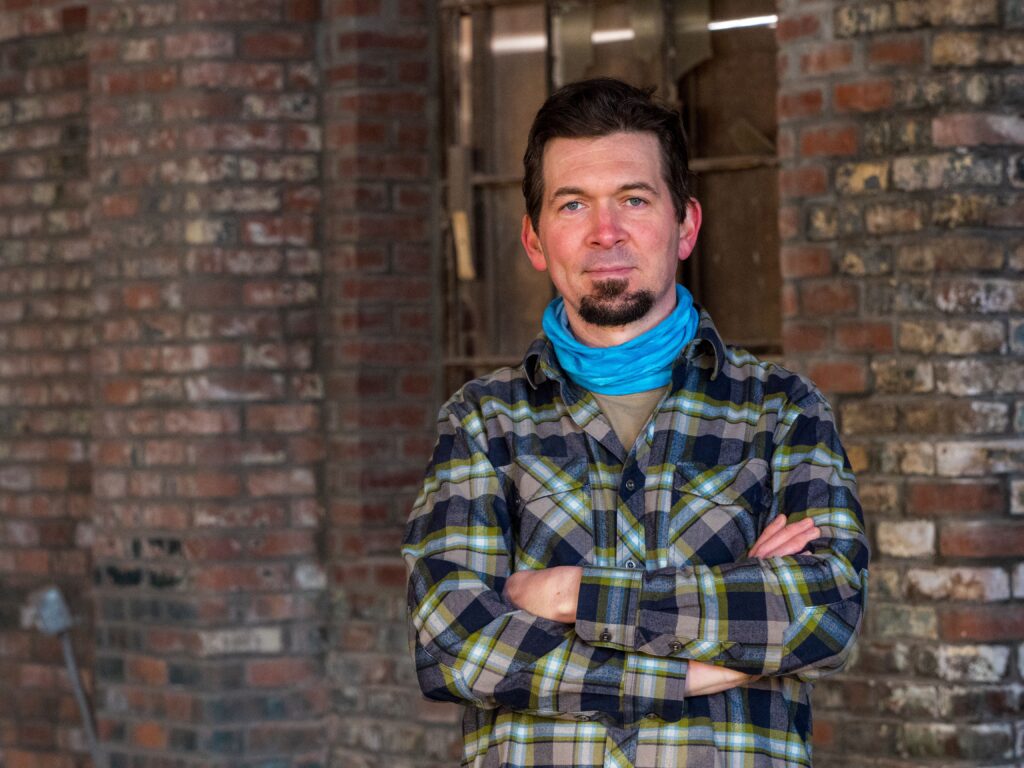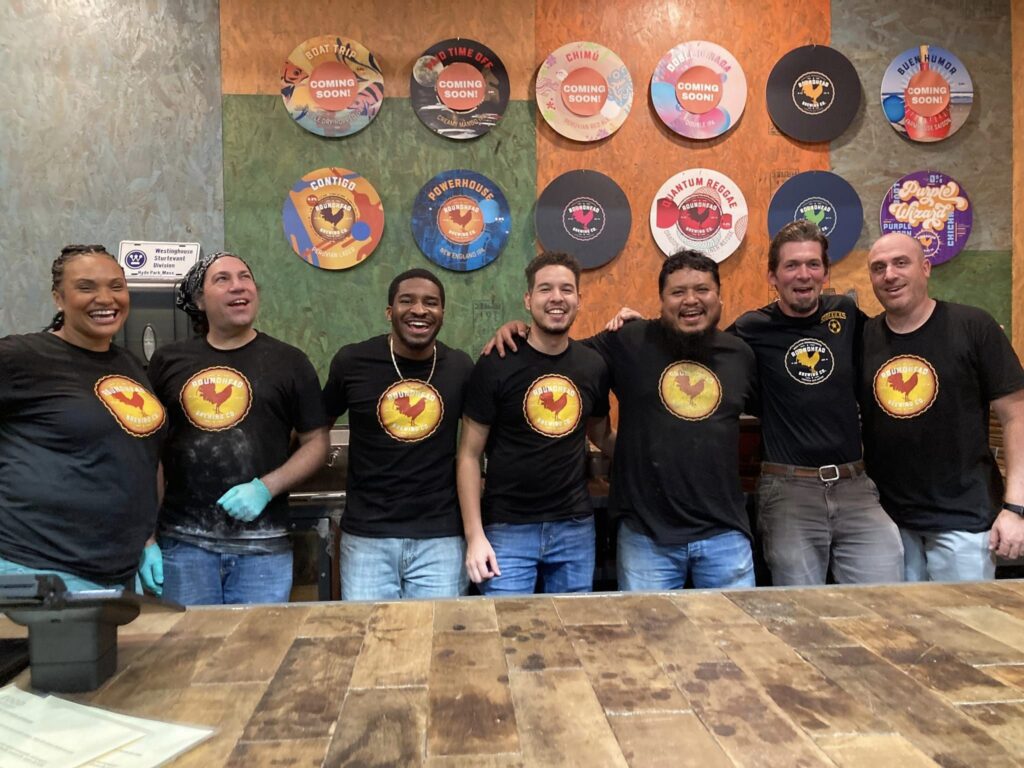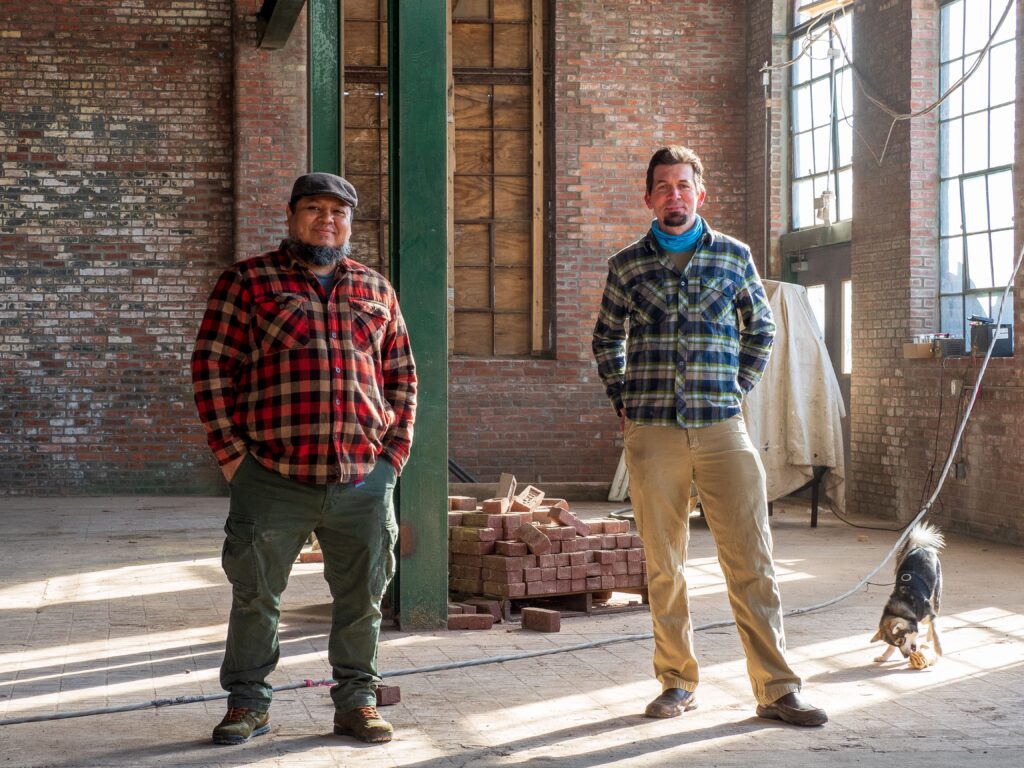Alum Uses Emerson-Honed Skills to Boost Brewery Biz
Craig Panzer , MFA ’11 is the co-owner and COO of Roundhead Brewing Company, which opened its taproom in Boston’s Hyde Park neighborhood in October 2022.

Panzer spoke to Emerson Today about how his Emerson degree fits with owning a brewery, as well as pizzas and zoning, and unique beer (fermentation assisted by reggae music?). The following is an abbreviated version of the interview.
Q: Why did you want to open a brewery?
Panzer: Roundhead launched in the basement of co-owner Luis Espinoza in 2017. We met through our kids playing youth soccer, and that took place in 2021. That was the hatching of the business from a standpoint of a corporation, getting our license, and selling our brews.
I love beer. I love food and beverage. It brings people together. Great beer is a great starting point for people to get together.
When I met Luis, I saw he was a coming at beer in a new way. I attended [a community event where] he served beer and food. He’s a professional chef. The next day I texted him…that text turned into an invitation to look for a location for our business.
Q: What were you working on before the brewery?
Panzer: While at Emerson I taught an undergrad writing class as an adjunct faculty member while getting my MFA. [Professor Emeritus] Dr. Jon Trimbur brought a cultural studies approach to the content for teaching writing, where you bring forward a student’s knowledge and culture to ignite their interest in the calling to write. I had that loaded in me.
I got a full-time job at City Feed and Supply [in Boston], a mom-and-pop deli, to start up a marketing department. The owner had previously done the marketing. I built out that department. I was there for five or six years and my role grew to become director of operations. I love small business. I love their place in the community to create jobs, values, and the leadership needed.
I then worked at a nonprofit, Interise, that works with small businesses to establish their StreetWise MBA. They helped businesses past the startup point, when they’re poised for further growth, and we provided them with knowledge, knowhow, and the network to grow their business. It gave me a great background in local business in a local economy, and how to make economy more equitable. It supported Black and Brown entrepreneurs, and data [from business owners who graduated from the program] showed how businesses created wealth and revenue, and furthered job creation.

From attending the StreetWise MBA several times, I learned about the importance of delegation, the chief challenges that business owners face, and that you can’t do it all. I learned these fundamental themes that power small business growth.
Then I met Luis, who wanted to go into the brewing business, and saw how hard it was for him to crack into the scene. He was looking for an entry job in the brewing business and was just getting rejected. He had emigrated from Peru, and had lived in Boston for 10 years before we met. He saw that beer is about recipe development. Beer and brewing — I relate it to a cook in the kitchen. With beer, you’re assembling hops, grain, and the yeast you throw in. It’s a recipe. Luis [and I were] so excited by the flavors he was creating, and doing wild stuff like using reggae music during fermentation, and felt it made a difference.
Knowing there are so few breweries owned by people of color, I had a mission of making a Latino-owned brewery, and to have people enjoy the beer as much as I did, and having Latin culture to have a platform to show the many ways that beer can be made.

Q: How has your Emerson experience helped you professionally/personally?
Panzer: Emerson gave me an incredible awareness. I had been writing for years, but I didn’t see the writing situation clearly. I saw the power I wielded based upon being a white male, and [white males] in the cannon of writing, and saw the better role I could play in changing narrative, and disrupting narrative.
Q: How are you applying your Emerson skills for Roundhead Brewing?
Panzer: Communication. I think back to Trimbur’s class when he spoke about the beginning of Emerson, and that it was about being masters in rhetoric and oration. Communication is in everything I do: working with staff, communicating with our team, and communicating our values to customers.
I do the marketing for Roundhead. My job now is to tell the story of a brewery so people can connect with it. It’s been about how I can be a connector to use my writing ability and communications skills with others to connect people to the beer of Roundhead Brewing and the passion of Luis Espinoza. When I was teaching at Emerson, it was connecting those young writers with their purpose and the subjects they’re passionate about writing.
Q: If there were an Emerson beer, what do you think it would entail?
Panzer: Emerson’s beer would be a series because there are so many different talents at Emerson. Each beer could feature another part of Emerson.
Q: What’s the food like at Roundhead Brewing?
Panzer: It features a pizza kitchen. Dough is a platform to do crazy things. Yeah, you got cheese and toppings. We’re putting chorizo on it with kale, honey, mozzarella, and cotija cheese. And smoked pork belly with sweet potato puree, mozzarella and yellow pepper sauce.
We wanted to be able to make simple food that paired well with beer. We wanted it to be easy to make so nonprofessional chefs could make it good and accessible. It’s approachable food. We wanted something that would interest both new chefs and a wide variety of food goers, and please the whole family. We found out we weren’t zoned to just serve beer. But if we could sell food, we learned that would work. It was done out of necessity. But it turned out to being something that is fundamental to our identity.
Categories